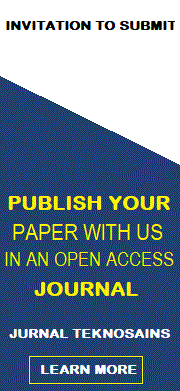Perkembangan kota banda Aceh pasca bencana tsunami 2004
Raja Al-Fath(1*), Agam Marsoyo(2)
(1) Universitas Gadjah Mada
(2) Universitas Gadjah Mada
(*) Corresponding Author
Abstract
Every city keeps growing as a result of population growth and has an impact on space requirements. Same as Banda Aceh City which continues to grow, but its development has stopped due to the 2004 tsunami disaster. Residential areas tend towards the north or the coast, which is tsunami-prone zone. The purpose of this study is to describe the direction and built-up area development of Banda Aceh City after the tsunami from 2005-2011, 2011-2015, and 2015-2020. The data used in this study is spatial data such as maps and satellite images sourced from Banda Aceh planning and development agency. Data analysis uses spatial approach with the overlay method. Development of the built-up area of Banda Aceh city based on the period 2005-2011, 2011-2015, and 2015-2020 shows that the built-up area leads to the northern and southern parts of Banda Aceh City. Development of the northern part of the city, Districts of Jaya Baru, Meuraksa, Kuta Raja, Kuta Alam, and Syiah Kuala was a result of the rehabilitation and reconstruction efforts such as housing, roads, and facilities after tsunami and turned the ponds and vacant land into housing and service trading areas. The northern part of Banda Aceh City was tsunami hazard-prone zone. Meanwhile, development of the southern part of the city, districts of Banda Raya, Lueng Bata, and Ulee Kareng, was influenced by Mohamad Hasan and Ali Hasyimi street which triggered the development of residential areas, office areas, service trading areas, and public facilities. Southern part of the city was not directly affected by the tsunami disaster. In addition, built-up area development has spread to the Aceh Besar regency.
Keywords
Full Text:
PDFReferences
Ahlqvist, O. (2009) ‘Overlay (in GIS)’, in R. Kitchin dan N. Thrift (eds) International Encyclopedia of Human Geography. Oxford: Elsevier, pp. 48–55. Available at: https://doi.org/10.1016/B978-008044910-4.00487-9.
Akbar, A. dan Ma’rif, S. (2014) ‘Arah Perkembangan Kawasan Perumahan Pasca Bencana Tsunami di Kota Banda Aceh’, Jurnal Teknik PWK, 3(2), pp. 274–284.
Branch, M.C. (1985) Comprehensive City Planning: Introduction & Explanation. Chicago: The Planners Press of the American Planning Association.
BRR (2006) Aceh and Nias Two Years After the Tsunami. Banda Aceh: CV Andika Pratama.
Frankenberg, E., Gillespie, T., Preston, S., Sikoki, B. and Thomas, D. (2011) ‘Mortality, The Family and The Indian Ocean Tsunami’, 121, pp. 162–182. Available at: https://doi.org/10.1111/j.1468-0297.2011.02446.x.
Jin, K.S. dan Young, K.T. (2013) ‘Transformation of Urban Spatial Structure Around the Old Castle in Cheong-ju City’, Journal of the Korean Institute of Rural Architecture, 15(1), pp. 89–96.
Kaviari, F., Mesgari, M.S., Seidi, E. dan Motieyan, H. (2019) ‘Simulation of urban growth using agent-based modeling and game theory with different temporal resolutions’, Cities, 95. Available at: https://doi.org/10.1016/j.cities.2019.06.018.
Larasati, N.M., Subiyanto, S. dan Sukmono, A. (2017) ‘Analisis Penggunaan dan Pemanfaatan Tanah (P2T) Menggunakan Sistem Informasi Geografis Kecamatan Banyumanik Tahun 2016’, Jurnal Geodesi Undip, 6(4), pp. 89–97.
Li, X., Zhou, W. dan Ouyang, Z. (2013) ‘Forty years of urban expansion in Beijing: What is the relative importance of physical, socioeconomic, and neighborhood factors?’, Applied Geography, 38(1), pp. 1–10. Available at: https://doi.org/10.1016/j.apgeog.2012.11.004.
Liu, Yansui, Liu, Yu, Chen, Y. dan Long, H. (2010) ‘The process and driving forces of rural hollowing in China under rapid urbanization’, Journal of Geographical Sciences, 20(6), pp. 876–888. Available at: https://doi.org/10.1007/s11442-010-0817-2.
Mahendra, Y.I. dan Pradoto, W. (2016) ‘Transformasi Spasial di Kawasan Peri Urban Kota Malang’, Jurnal Pembangunan Wilayah & Kota, 12(1), p. 112. Available at: https://doi.org/10.14710/pwk.v12i1.11462.
Metekohy, E.F. (2020) Transformasi Spasial dan Arah Perkembangan Kota Ambon Tahun 1999-2019. Thesis. Gadjah Mada University.
Rachmah, Z., Rengkung, M.M. dan Lahamendu, V. (2018) ‘Kesesuaian Lahan Permukiman di Kawasan Kaki Gunung Dua Sudara’, Jurnal Spasial, 5(1), pp. 118–129.
Rahmah, N. (2017) Transformasi Spasial Kota Lasem: 1925-2015. Thesis. Gadjah Mada University.
Surya, B., Syafri, Abubakar, H., Sahban, H. dan Sakti, H.H. (2020) ‘Spatial Transformation of New City Area: Economic, Social, and Environmental Sustainability Perspective of Makassar City, Indonesia’, Journal of Southwest Jiaotong University, 55(3), pp. 1–29. Available at: https://doi.org/10.35741/issn.0258-2724.55.3.30.
Syahbudin, B., Suhartono, C., Soerjoatmodjo, G.W.L., Soelistio, H., Saputra, O.A. dan Mathari, R. (2009) TSUNAMI From Disaster to the Emergence of Light. Banda Aceh: Badan Rehabilitasi dan Rekonstruksi NAD-Nias.
Tan, R., Liu, Y., Zhou, K., Jiao, L. dan Tang, W. (2015) ‘A game-theory based agent-cellular model for use in urban growth simulation: A case study of the rapidly urbanizing Wuhan area of central China’, Computers, Environment and Urban Systems, 49, pp. 15–29. Available at: https://doi.org/10.1016/j.compenvurbsys.2014.09.001.
Tuloli, Muh.Y. (2013) Perkembangan Spatio Temporal Perkembangan Kota Gorontalo. Thesis. Gadjah Mada University.
Watkins, M.H. dan Griffith, C.A. (2015) Synthesis Report from the 2nd International Conference on Urbanization and Global Environmental Change Urban Transitions & Transformations: Science, Synthesis, and Policy. Tempe, USA. Available at: https://doi.org/10.1017/CBO9781107415324.004.
Yunus, H.S. (2000) Struktur Tata Ruang Kota. Yogyakarta: Pustaka Belajar.
Article Metrics
Refbacks
- There are currently no refbacks.
Copyright (c) 2023 Raja Al-Fath & Agam Marsoyo

This work is licensed under a Creative Commons Attribution-ShareAlike 4.0 International License.
Submit an Article Tracking Your Submission
Editorial Policies Publishing System Copyright Notice Site Map Journal History Visitor Statistics Abstracting & Indexing










